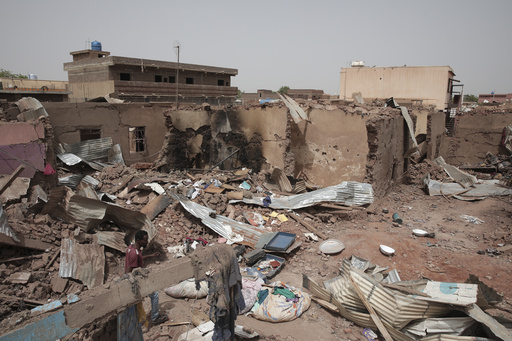
CAIRO — A senior official from the United Nations urged the international community to focus on what he termed “the forgotten crisis” in Sudan, where ongoing conflict has brought the nation to the verge of famine. Ted Chaiban, the deputy director of UNICEF, made this plea as the infamous paramilitary group, the Rapid Support Forces (RSF), continued their violent rampage across villages and towns in the east-central Gezira province, leading to reports of looting, vandalism, and numerous casualties.
Chaiban highlighted the war, which erupted in April 2023 between the Sudanese military and the RSF, as contributing to “one of the most acute crises in living memory.” The conflict has caused over 14 million individuals to flee their homes, positioning Sudan as the country facing the greatest displacement crisis worldwide. “We’ve never seen such staggering numbers in a generation,” he noted during an interview, elaborating on the harrowing conditions faced by 8.5 million people experiencing emergency levels of food insecurity and an additional 775,000 at risk of famine.
The current crisis follows a pro-democracy uprising that ousted long-time dictator Omar al-Bashir approximately four years ago, leading to a short-lived attempt at democracy. This ongoing conflict has claimed more than 24,000 lives, as recorded by the Armed Conflict Location and Event Data group, which has monitored the situation since its commencement.
During a recent trip to eastern Sudan, both Chaiban and Raouf Mazou, the assistant high commissioner for operations at the U.N. refugee agency (UNHCR), met with local officials and visited a large displacement camp with over 4,000 residents in Kassala province. They stressed the necessity for unrestricted access to those in need across the country, calling for a renewed global focus on what Chaiban termed “one of the critical generational crises we’re facing.”
Meanwhile, international attention has shifted significantly towards the Middle East due to escalating conflicts, particularly following Hamas’ attack on southern Israel last October. This event resulted in significant casualties, with estimates of around 42,000 fatalities in Gaza alone, according to the health ministry in the region. The ongoing conflict in Israel and Hezbollah’s involvement in Lebanon has drawn further global concern.
Chaiban emphasized, “While we have addressed the situations in Gaza and Lebanon, Sudan equally deserves this level of attention.”
In recent weeks, the Sudanese military has intensified its offensive to reclaim territories held by the RSF around the capital, Khartoum. Notably, the military captured Jebel Moya, a strategically significant area in Gezira province, marking a considerable defeat for the RSF. Moreover, a leading RSF commander, Abu Aqlah Keikel, reportedly defected and surrendered to the military, claiming he chose to align with the armed forces after realizing the deceptive nature of the RSF’s claims.
The RSF, led by Gen. Mohamed Hamdan Dagalo, attempted to downplay Keikel’s defection. Initially supportive of the military, he shifted allegiance to the RSF in August of the previous year, according to the Sudan War Monitor, an organization monitoring the conflict.
Following Keikel’s surrender, RSF fighters retaliated violently, launching attacks in various towns and villages throughout Gezira, causing significant civilian casualties and displacing thousands. Reports indicated that in the town of Sariha, at least 50 were killed and around 200 were injured, while 12 fatalities were confirmed in the neighboring village of Saqiaah.
The Doctors’ Union in Sudan characterized the RSF actions as transforming eastern Gezira into “a brutal war zone.” They criticized the RSF for committing “systemic sexual crimes, arson, attacks on healthcare environments, as well as widespread looting and forced displacements,” reflecting the dire situation experienced by innocent civilians.
The conflict has been marred by severe atrocities, including mass sexual violence and killings driven by ethnic strife. Both the United Nations and various international human rights organizations classify numerous actions during the conflict as war crimes and crimes against humanity, especially in western Darfur, where the RSF has launched significant offensives.
The ongoing conflict has placed Sudan on the brink of famine, a situation exacerbated since earlier predictions noted acute hunger threats in locations like the Zamzam camp for displaced individuals, situated approximately 15 kilometers from North Darfur’s troubled capital, al-Fasher. Experts from the Famine Review Committee anticipate that roughly 25.6 million people—over half of Sudan’s population—will confront severe food shortages this year.
